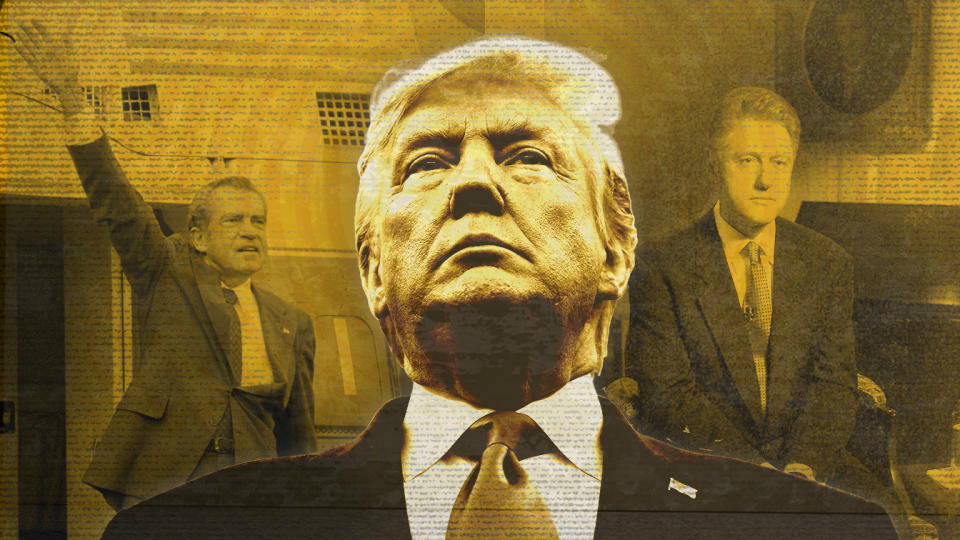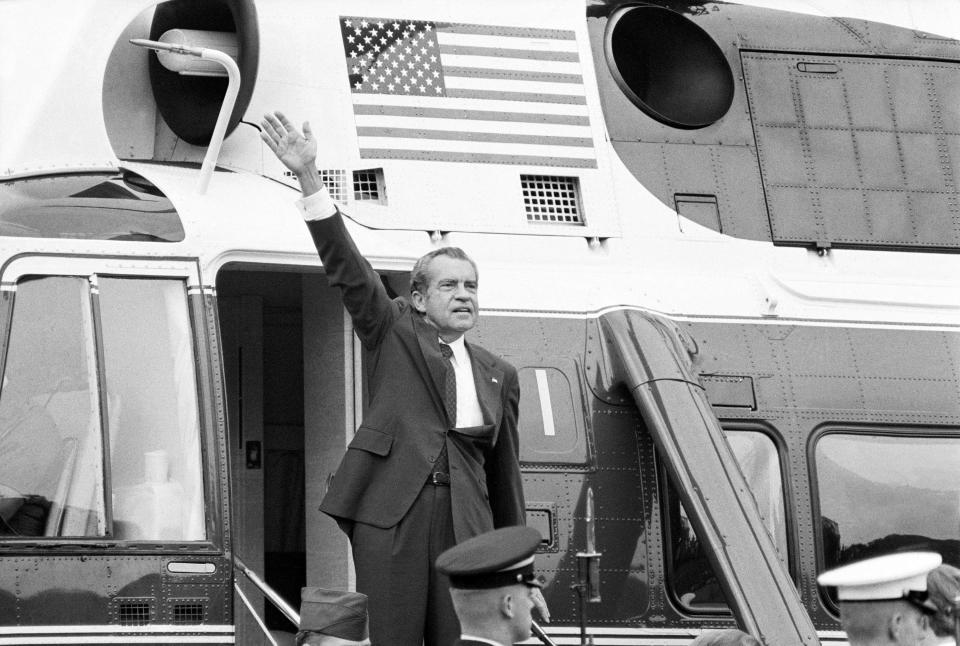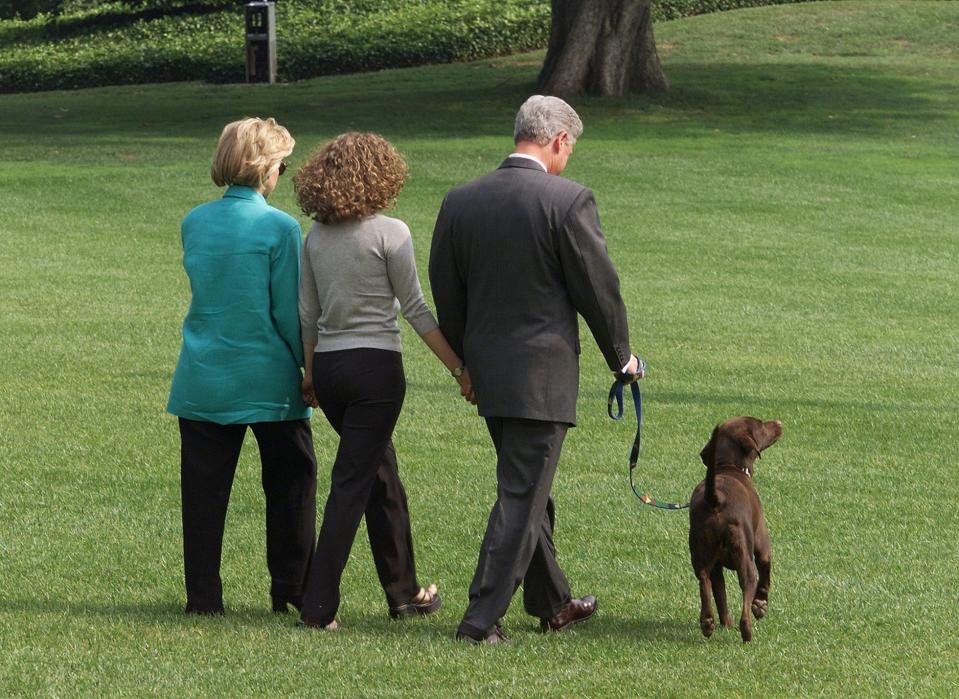Impeachment and a path to redemption for Trump
President Trump and his supporters are choosing a path much different than that taken by the redeemed Bill Clinton, and much more like that taken by the disgraced Richard Nixon, in refusing to acknowledge any wrongdoing in the Ukraine matter as a strategy to beat conviction and removal. Yet a little contrition could go a long way.

Clinton ended up rising in popularity after admitting to his indiscretions with Monica Lewinsky. Once Clinton and his supporters were willing to confess error, the steam was largely taken out of the sails of independent counsel Kenneth Starr and the House impeachment managers seeking to remove the president. As that impeachment drama played out in the late ’90s, I remember speaking to a 6-foot nun who was principal of the school my kids attended. She pulled me aside and said, “At least Clinton admitted it. Why don’t they leave him alone now so he can do his job.” I shared this story with Clinton during an interview and told him: “I knew once you won over the 6-foot nun, they’d never get enough votes to remove you.” He smiled and praised the nun for her good sense before acknowledging his own remorse. Admitting fault did not come easily to Clinton. Yet it allowed him to conclude his presidency on a productive, positive note.

Nixon took a dramatically different approach. He viewed himself as a political pugilist who was constantly fighting enemies. He resisted turning over the damning tapes of his Oval Office conversations until the very end. It was only after he ordered the firing of special prosecutor Archibald Cox in the infamous Saturday Night Massacre in 1973 and the landmark Supreme Court decision in U.S. v. Nixon ordering him to release the tapes that his presidency unraveled.
Even after Nixon resigned, he fought doggedly against admitting guilt. He even fought with his own lawyer, Herbert “Jack” Miller, and initially rejected the proposed pardon when President Gerald Ford’s attorney, Benton Becker, informed him that a 1915 Supreme Court decision, Burdick v. U.S., held that acceptance of a pardon was an admission of guilt. Even after a deal was struck, Nixon nearly changed his mind about accepting the pardon just hours before Ford was to announce it on national television, because he didn’t want to issue an apology. Until the bitter end, Nixon fought against admitting wrongdoing of any kind.

Thus far, Trump’s dogged refusal to acknowledge improper behavior has worked for him, just as it initially did for Nixon. In the end, though, it’s a dangerous gambit. The American public may love a pugilist and cheer him on. But it will be increasingly difficult for his supporters to keep defending him once more and more facts are laid out to the public in a Senate trial.
One of the most poignant moments in my interviews with Clinton came in 2005, when I asked him how he viewed the scandals that had beset his presidency. He looked out the window pensively and said: “There were some really positive aspects. I mean, you know, if you live a busy life, you risk the fact that a lot of your life goes unexamined, both the good and the bad parts of it. And then all of us have secrets, and we’re entitled to them. But once you’ve been publicly humiliated like I was, you really don’t think you have anything to hide anymore. It doesn’t really much matter what people ever say about you again for the rest of your life. And it’s kind of liberating.”
Clinton concluded that his temporary fall from grace was painful, yet it was also oddly therapeutic for him. He said: “I’d give anything if I hadn’t done it and anything if it hadn’t happened — but there were some unbelievable touching moments. As well as the larger fact that my family came through it and the public stayed with me.”

With Republicans unable to muster even a simple majority on either article of impeachment, Clinton emerged victorious in the Senate trial. He did so in part because he, his White House lawyers and his Senate defenders stopped trying to make excuses for these lapses of judgment and decided not to deny them. Penitence allowed Clinton to seek forgiveness and a path to redemption, something the American public, time and again, seems prepared to grant generously.
Trump’s most effective path forward, not only to prevail in the impeachment proceedings but to end this ordeal and create a strong position from which to govern, is to follow the Clinton model rather than the Nixon path.
It would be a smart, showstopping and, admittedly, wholly uncharacteristic move for Trump to express remorse and ask the American public to move on for the good of the nation. Particularly given the most recent, damning information from Lev Parnas, implicating Trump in the Ukraine affair even more deeply, the president’s blanket denials are ringing hollow and are not advancing his cause. True, apologies do not come easily to a man who dug in when the “Access Hollywood” tapes were released, and whose mentor, lawyer Roy Cohn, lived by the credo “Always attack. Never apologize.” That’s why a poignant, heartfelt apology would have a powerful and effective impact. Trump should step up to a microphone in the Rose Garden as the impeachment trial gets underway and state: “I’ve had time with my family over the past weeks to think about these things, and I now see that my call to President Volodymyr Zelensky was not a perfect call. In fact, I acknowledge that it was a bad idea, and I can assure you it won’t happen again.” If he were to do this, Trump’s approval ratings would jump upward and the impeachment trial in the Senate would fizzle out — just as it did for Clinton — as popular support shifted strongly against conviction and removal.
Of course, it’s easy to write those words of contrition on paper and imagine a way out for this president. But only Trump himself can actually speak them.
Ken Gormley is president of Duquesne University. He is the author of a book on Watergate and “The Death of American Virtue: Clinton vs. Starr,” about the Clinton investigations and impeachment.
_____
Read more from Yahoo News:
Did the U.S. 'assassinate' Iranian general or just kill him? Why it matters
Saudis warn of new destructive cyberattack that experts tie to Iran
Your Democratic primary cheat sheet: In the run-up to Iowa, who's still in the race?
PHOTOS: Ukraine International Airlines plane crashes in Iran killing all on board



